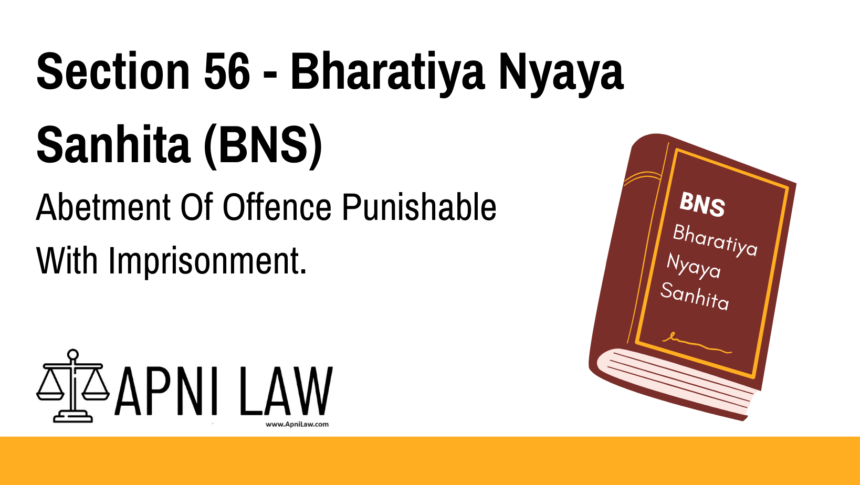Code: Section 56 BNS
Whoever abets an offence punishable with imprisonment shall, if that offence be
not committed in consequence of the abetment, and no express provision is made under this
Sanhita for the punishment of such abetment, be punished with imprisonment of any
description provided for that offence for a term which may extend to one-fourth part of the
longest term provided for that offence; or with such fine as is provided for that offence, or
with both; and if the abettor or the person abetted is a public servant, whose duty it is to
prevent the commission of such offence, the abettor shall be punished with imprisonment of
any description provided for that offence, for a term which may extend to one-half of the
longest term provided for that offence, or with such fine as is provided for the offence, or
with both.
Illustrations.
(a) A instigates B to give false evidence. Here, if B does not give false evidence, A has
nevertheless committed the offence defined in this section, and is punishable accordingly.
(b) A, a police officer, whose duty it is to prevent robbery, abets the commission of
robbery. Here, though the robbery be not committed, A is liable to one-half of the longest
term of imprisonment provided for that offence, and also to fine.
(c) B abets the commission of a robbery by A, a police officer, whose duty it is to
prevent that offence. Here, though the robbery be not committed, B is liable to one-half of the
longest term of imprisonment provided for the offence of robbery, and also to fine.
Explanation of Section 56 BNS
1. Understanding Abetment of Imprisonable Offences
- Section 56 applies when a person abets an offence punishable with imprisonment but the offence is not actually committed.
- This ensures that abetment itself remains a punishable offence under Indian law.
2. Punishment Under Section 56
- If the crime is NOT committed:
- Up to 1/4th of the maximum imprisonment prescribed for that offence OR fine OR both.
- If the abettor is a public servant responsible for preventing the crime:
- Up to 1/2 of the maximum imprisonment prescribed for that offence OR fine OR both.
This section holds public servants accountable if they abet crimes they were supposed to prevent.
3. Key Elements of Section 56
- There must be an abetment of an offence that carries imprisonment.
- The crime does NOT have to be committed for punishment to apply.
- If the abettor is a public servant, the punishment is more severe.
For related sections, see:
- Section 55 BNS – Covers abetment of offences punishable with death or life imprisonment.
- Section 53 BNS – Covers abettor’s liability for unintended consequences of their actions.
Illustration of Section 56 BNS
Example from the Law
Case 1: A instigates B to give false evidence in court. B refuses.
- Even though B did not give false evidence, A is still liable under Section 56 and may face 1/4th of the maximum imprisonment for perjury or fine or both.
Case 2: A police officer abets a robbery that never takes place.
- Since the abettor is a public servant, they may face 1/2 of the maximum imprisonment for robbery or fine or both.
Common Questions and Answers on Section 56 BNS
1. What is the purpose of Section 56 BNS?
It ensures that abetment of a crime is still punishable even if the crime is not completed.
2. Does Section 56 apply to all types of offences?
No, it applies only to offences punishable with imprisonment. For serious offences like murder, see Section 55 BNS.
3. What happens if the abettor is a public servant?
If the abettor is a police officer or other public official, they face a harsher penalty—up to half the maximum imprisonment prescribed for the crime.
4. What is the difference between Section 56 and Section 55?
- Section 55 BNS – Covers abetment of offences punishable with death or life imprisonment.
- Section 56 BNS – Covers abetment of offences punishable with imprisonment (but not death/life imprisonment).
5. Is there any defence under Section 56?
If the accused can prove that there was no actual abetment or intent, they may avoid conviction. However, mere regret after abetting the crime does not absolve liability.
Conclusion
Section 56 of the Bharatiya Nyaya Sanhita (BNS), 2023, ensures that abetting a crime is punishable even if the crime is not committed. It also holds public servants accountable for abetting crimes they were supposed to prevent.
For more legal insights, visit ApniLaw today! 🚀








